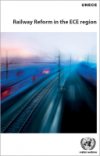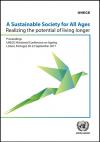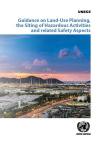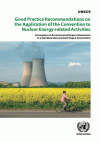Publications
Displaying Results 741 - 760 of 2813
- Pусский
This study on railway reform in the ECE Region looks at the history of railway reform within its member States and looks at how it has been implemented through a number of examples, highlighting that railway reform across the ECE region has taken different forms in terms of institutional structure, market participants and development of the sector.
- Français
This study on railway reform in the ECE Region looks at the history of railway reform within its member States and looks at how it has been implemented through a number of examples, highlighting that railway reform across the ECE region has taken different forms in terms of institutional structure, market participants and development of the sector.
- English
This study on railway reform in the ECE Region looks at the history of railway reform within its member States and looks at how it has been implemented through a number of examples, highlighting that railway reform across the ECE region has taken different forms in terms of institutional structure, market participants and development of the sector.
- English
This publication documents the third cycle review and appraisal of the implementation of the Madrid International Plan of Action and its Regional Implementation Strategy (MIPAA/RIS, 2002) in UNECE member States between 2012 and 2017. The regional review concluded with the 4th UNECE Ministerial Conference on Ageing held in Lisbon, Portugal, on 20-22 September 2017. The Ministerial Conference,
- English
Phase 1 of the Highspeed Masterplan for the TER region has now been completed. The study is available here and covers the following areas:- An introduction to, and history of, High Speed Railways- A review of the benefit, political background, best practice and status of high-speed- Review of related work,
- English
- English
- English
This document contains information on the purpose and role of UNECE Country Profiles in facilitating legal, political and infrastructural reforms in UNECE countries; the rationale behind the country profiles structure; and the guidelines for the preparation of country profiles. The current revised guidelines reflect findings and recommendations of the independent evaluation of UNECE country
- English
Practical guidance on reforming legal and institutional structures with regard to the application of the Protocol on Strategic Environmental Assessment ENG/RUSThis practical guidance aims to assist countries of Eastern
- English
Global Tracking Framework: UNECE Progress in Sustainable Energy(UNECE ENERGY SERIES No. 49)Also available in French and Russian: Cadre mondial de suivi : Progres realises par la CEE en matiere d'energie
- English
The Guidance on Land-Use Planning, the Siting of Hazardous Activities and related Safety Aspects has been developed in close cooperation with the constituencies under three legal instruments of the United Nations Economic Commission for Europe (UNECE) – the Convention on the Transboundary Effects of Industrial Accidents (Industrial Accidents Convention), the Convention on Environmental Impact
- English
- English
The Guidance on Land-Use Planning, the Siting of Hazardous Activities and related Safety Aspects has been developed in close cooperation with the constituencies under three legal instruments of the United Nations Economic Commission for Europe (UNECE) - the Convention on the Transboundary Effects of Industrial Accidents (Industrial Accidents Convention), the
- English
This report presents the findings from the assessment of the water-food-energy-ecosystems nexus, linked with a study of benefits of transboundary cooperation, in the Drina River Basin, mainly shared by Bosnia and Herzegovina, Montenegro and Serbia which was carried out from 2016 to 2017 in the framework of the UNECE Water Convention’s Programme of Work. The assessment aimed to foster
- English
As the second most polluting industry, the textile sector is responsible for a large portion of the world’s CO2 emissions and industrial waste, not to mention the exploitation of “indecent” working conditions. At the same time, the industry has a complex value chain, with production facilities located all over the world, which makes it very hard to gain accurate information about sources and
- English
Within the United Nations Economic Commission for Europe (UNECE), the United Nations Centre for Trade Facilitation and Electronic Business (UN/CEFACT) has developed a series of some 30 recommendations and standards that are used worldwide to simplify, standardize and harmonize trade procedures and information flows. Many of these are now international standards of the International
- English
The Economic Commission for Europe (UNECE) has a long history of offering trade facilitation guidance, especially on the topic of Single Window. Since its emergence in 2004, Recommendation 33 on implementing a Single Window has been widely received as the reference on the subject and is used as the basis for many other organizations’ work as well as the cornerstone of many national
- English
Recommendation 42 on Trade and Transport Facilitation Monitoring Mechanisms (TTFMM) addresses issues related to institutional arrangements and methodology in designing and implementing TTFMM. It is an important contribution to UNECE’s suite of Trade Facilitation recommendations and guidance material.Download the Publication ECE/TRADE/
- English
Since the introduction in 1973 as the UNECE Recommendation No. 1, the UN Layout Key (UNLK) has provided Governments, organizations and the business community with a basis for a standard and aligned design of documents used in trade and transport. This has led to a major improvement in the standardization of trade documents in many countries throughout the world.Most international organizations
- English
Conventional economic statistics, such as national accounts and employment measures, are largely designed to measure the market economy and in most countries exclude unpaid household service work. Economists have argued for many years that ignoring these services introduces biases in various areas of economic analysis. For instance, an increase in childcare or long-term care provided by the


















